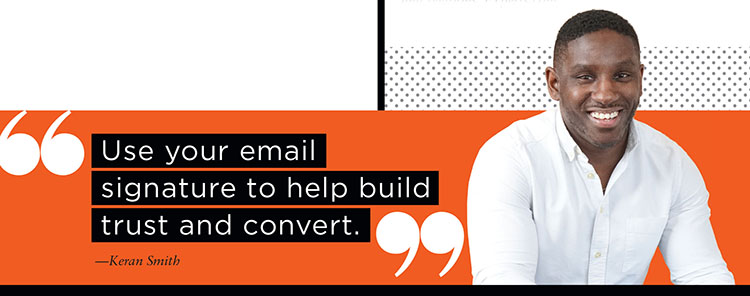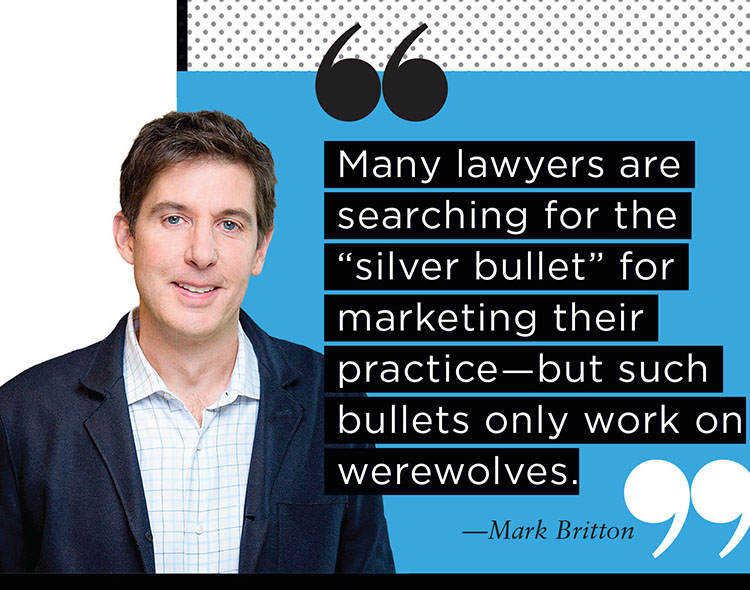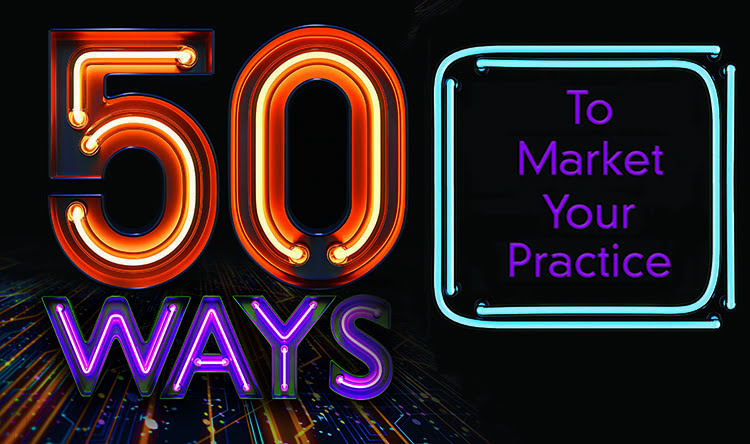Cover Story
Thanks to the internet and social media, there have never been more ways to market your legal practice. But having so many options can be paralyzing. Additionally, the pressure of differentiating yourself from your competitors can be immense.
The ABA Journal asked lawyers, legal professionals, marketers, consultants and other experts how lawyers can stand out. Here are 50 tips for marketing your practice. (Responses have been edited for clarity and space.)
Be yourself
1. First, ask yourself why you get you get out of bed every morning. Second, begin to identify your average ideal client. Who are they (demographics)? Do they share common characteristics (i.e., location, age, other demographic characteristics)? What makes them tick (psychographics)? Create target client personas. Finally, identify how you are uniquely qualified to help them. Try to come up with three ways that you can help them that, when considered together, are unique to you and your practice. —Gyi Tsakalakis, president, AttorneySync
2. Even if you’ve had a law firm for ages, it’s a great idea to sit down regularly and think about who it is you want to work with and what type of work you want to do, because it changes. —Erin Levine, founder and CEO, Hello Divorce
3. People appreciate straight talk, not marketing talk. So that means lose the photos of globes, stuffy people in suits carrying briefcases and the images of multiracial hands grasping each other. And lose the phrase, “We are different.” It is woefully overused. —Nicole Auerbach, founding partner, Valorem Law
4. I revamped my bio to include being a mother and a runner and also put up an “about me” page on my website that had personal pictures. Difficult as that was personally, the dividends have been tremendous. I get calls from clients who say they hired me specifically because I showed who I am. —Megan Zavieh, founder, Zavieh Law
5. We post pictures of us doing yoga together and talk about/focus on long-term whole body and mind wellness and linking it to family law, which we practice. —Billie Tarascio, founder, Modern Law
6. Avoid the trap of diving into tactics—such as speaking engagements, media quotes or conference sponsorships—without first focusing on your practice’s strategy. Who are you trying to reach? What marketing methods will reach them best? What differentiates your practice, and how do you want to be viewed in the marketplace? —Deborah Farone, founder, Farone Advisors

Shutterstock
7. Connecting with people on social media on a personal level is incredibly valuable. My Twitter feed is a mix of attorney ethics tweets, comments on other lawyers’ posts about regulation and legal issues—and my dogs. My dogs actually bring me business. —Megan Zavieh
8. Google your law firm: Regardless of how someone “hears about you,” they’re likely to search for information about you online. Most of these searches will start with Google. That makes Google My Business one of the most essential tools for marketing your practice online. —Gyi Tsakalakis
Don’t try to do it all
9. You’re not the right lawyer for everyone. Once you accept this fact, you can begin to transform the performance of your marketing. —Gyi Tsakalakis
10. The lawyers I refer to the most are those who have an expertise in a specific practice area—as opposed to being a door lawyer (any case that walks in the door). When you specialize, it makes it easier for other lawyers to refer you cases. —Adam Camras, CEO, Legal Talk Network
11. Don’t be afraid to be too nuanced or niche, because people like to feel as if you’re speaking to them. You might get fewer leads, but the ones you get will be better and more powerful. —Erin Levine
12. When promoting your practice, don’t market it to as many people as possible. For instance, don’t think of your potential clients as “the banks.” Consider which size bank is most likely to hire you, and where they are headquartered geographically, and who might be representing them today. The more you know about the prospect, the more likely you will be able to reach them. —Deborah Farone
13. I choose the three things I like best and do those. I don’t really enjoy a lot of networking events. Instead, I like social media, since it gives me a chance to connect with others in the industry and professional moms, and I also get leads and conversions. Choose what you like and what you’re good at. —Erin Levine
Provide excellent client-centric service
14. Your No. 1 marketing channel will always be word of mouth. That requires a firmwide commitment to client-centricity. Pick a brand or service that you love. Then ask yourself what you love about it. Nine times out of 10, you love it because [that brand or service] understands you and works to make you feel special. —Mark Britton, founder, Avvo

Photo by Quintin Perez and Ron Erick Odchigue
15. Understand your client’s “journey”—how they wound up with a problem they need help from a lawyer to solve. You will discover opportunities to engage with them so they never get to the point where they are out shopping for a lawyer or Googling things like “local divorce lawyer.” —Sam Glover, founder and chief technology officer, Lawyerist
16. Your phone and email inbox are an ATM. Make sure they are being respected, and promptly follow up on any new inquiries and provide proactive communication to existing and prospective clients. —Adam Camras
17. Lack of speed kills client development. First, it’s imperative that you have systems in place to deliver timely responses to potential clients. If you’re not “stopping their search for a lawyer” within 24 hours, you’re missing out on new business. Already responding within 24 hours? Try cutting that time in half. Second, are your web pages loading in about one second? Yes, you read that right, one second. That’s about all the time you have to keep their attention. Are you providing alternative ways to contact your firm (i.e., email, live chat, messaging apps)? Same rules apply. —Gyi Tsakalakis
18. In order to stand out, you must find ways to deliver remarkable experiences to clients and potential clients. First, create systems to gather feedback. If you don’t encourage feedback and make it easy for people to provide it, you might not ever realize you have issues. One tool that we find useful in this context is Gatherup (gatherup.com). Second, once you’ve received constructive feedback, take action. Listen to what they’re telling you, and make changes to improve. —Gyi Tsakalakis
19. Create a spreadsheet of clients’ interests (i.e., favorite teams, restaurants, hobbies, etc.) to use for planning events and tailoring guest lists. An added benefit is being able to sort the names by fields to see whom to invite. —Kelly Lynn Anders, deputy director, Harry S. Truman Presidential Library & Museum

Photo by Jason Dailey
20. Automate authentically: Marketing automation can be a transformative tool for efficiently nurturing relationships and positioning expertise. However, it’s imperative that automations don’t sabotage authenticity. For example, you might automate sending an email or even a physical postcard on someone’s birthday or key date. Furthermore, with every automation, ask: “What’s in it for the recipient?” In other words, how does it benefit them? —Gyi Tsakalakis
21. Clients today have very complex and cross-border needs. Our lawyers are most successful when they leverage the firm’s global footprint, technical acumen and institutional knowledge to offer seamless connectivity and an integrated “one firm” approach—with the client at the center. —Nora Shearer, chief marketing officer, Shearman & Sterling
Demonstrate expertise
22. So many lawyers feel that the best marketing comes from telling their clients and other lawyers how great they are, rather than proving it. Take speaking at a CLE. You might regard yourself as an expert in some field or other, but other lawyers don’t have a way of knowing that’s true until you bring to bear some of the central skills of good lawyering—breaking down complicated concepts so busy people can better understand them. —Erin Gerstenzang, founder, EHG Law Firm
23. Lawyers should market their practices by having a deep understanding of their clients’ strategy and goals, as well as their business processes and the industry landscape they are operating in. Our clients expect our lawyers to be deep in the know about the various legal compliance and regulatory developments surrounding their sectors. By keeping a close pulse on the industry, lawyers can offer unique forward-thinking insights to position their practice as a master of the next move, strategic partner and trusted adviser. This will organically lead to opportunities with their clients. —Nora Shearer
24. Showcase your expertise by giving away your best information. Sounds backward, but the truth is that if you demonstrate to the world that you know what you’re doing by giving them information that helps them, most people will come back around to you when they need your expertise. This can be done in blog posts, on social media, through presentations at local venues or even just by talking to people you meet. —Megan Zavieh

Shutterstock
25. Invest in a web app. One of the ways to attract more prospects is to provide value for free. When it comes to software, this can be fairly easy to do but will require some investment. —Allen Rodriguez, co-founder, ONE400
26. Firms that can offer potential clients services that are valued—yet don’t cost a potential client money—have a great mechanism to provide legal services to those in need and attract new clients. My office has created a number of freemiums. First, we offer a free case value calculator. The calculator can be found on our website and can be used for free 24/7. Second, we have created the PatBot. This is a chatbot that is found on the Palace Law homepage. Consumers can answer a few questions online that are asked by the PatBot, and when it’s done, it provides an analysis of the issues in their case. —Patrick Palace, owner, Palace Law
27. Become actively involved in a professional association or organization that is of sincere and mutual interest to you and prospective clients, and pour yourself into it—mere membership isn’t enough. This single marketing activity can create leadership, speaker, sponsor and author opportunities. At the same time, this can strengthen credibility, increase visibility and demonstrate investment in your prospective client’s industry. —Burton Taylor, president, Proventus Consulting
28. Lawyers need to have developed a firm grasp of clients’ business structures and processes. Having regular conversations with clients to understand their internal culture, processes and existing structures can serve as a competitive advantage. This includes understanding the structure of the client’s legal operations and their procurement process, knowing who the major stakeholders are, what the company’s risk appetite looks like, the data systems they have in place, and knowing the legal and compliance issues the business is grappling with. —Nora Shearer
Don’t zig when you should zag
29. Fewer than half of law firms even have a marketing budget, according to the 2019 Legal Technology Survey Report by the American Bar Association. This statistic is shocking and creates an opportunity for you to out-market your competition by simply setting aside funds for marketing. —Larry Bodine, web and marketing consultant, Larry Bodine Marketing
30. Try to send a card on an off-holiday to reduce competition and gain exposure. How many law firms do you think send out cards on Flag Day? You could be the one. Literally. —Jared Correia, CEO, Red Cave Law Firm Consulting
31. If you do your own marketing, imagery is key. It must be motivating and positive. We’re used to lawyers motivating by fear and the consequences of not hiring a lawyer (for example: pictures of people in handcuffs or children being pulled by parents in a literal tug of war). —Erin Levine

Photo by Kayla Smith
32. Everybody optimizes for Google, right? But Bing advertising is usually cheaper. There are fewer users, yes; but there’s also less competition. —Jared Correia
33. Use your email signature to help build trust and convert. Place a company video there, awards, answer an objection, etc. —Keran Smith, LYFE Marketing co-founder
34. Most attorneys I know are dipping into the Google/[search engine optimization] game, but very few are investing in Facebook in any meaningful way. As the age demographic of Facebook users has gotten older and broader, Facebook has become an essential marketing tool for lawyers. —Jordan Couch, partner at Palace Law
35. You know when you’re filling out online profiles, and you’re asked to add business hours? Don’t! That’s an invitation for someone not to call you. Let consumers assume that you’re open 24/7, and then provide coverage for that exposure by using a virtual receptionist service. Then you can convert those leads your competitors aren’t even acquiring. —Jared Correia
36. Utilize paid social media. If you are in a highly competitive “paid search” space, stop fighting to compete. Try an alternative route. Paid social ads are generally far cheaper than “paid search” ads. —Nick Rishwain, vice president of business development and relations, Experts.com
37. Buy Local Services ads on Google. This specific ad type is currently not available to all types of law and in all places. But as it becomes more accessible to more practices and areas, it will be huge to gain top real estate on Google for people actively looking for a lawyer. —Keran Smith
Plenty of media out there
38. Manage your own social media. Nobody knows your business/practice the way you do. It will be much more personal and much more endearing. Hiring an agency will do you very little good. They have a formula they follow. —Nick Rishwain
39. Podcasts are the perfect medium for education and training on the business of law (including marketing). During a commute, exercising, traveling, getting ready in the morning, Legal Talk Network has a number of shows geared toward helping lawyers run more efficient, effective and successful practices. —Adam Camras, CEO, Legal Talk Network

Photo courtesy of Nicole Auerbach
40. Spend the vast majority of your money on your website. That is the first place people look if they have heard of you, gotten a referral for you, etc. You can get very good-looking sites for not a ton of money. —Nicole Auerbach
41. Show your face on video. It is a great way to let potential clients get to know, like and trust you. Video allows people to feel like they know you before they have the opportunity to meet you in person. —Nick Rishwain
42. Consider developing a blog. At ElevateNext, we created one called the ElevateNext 2020 Vision Blog featuring legal visionaries giving predictions for 2025. Pat Lamb, my partner, built up a large and devoted following through his blog: In Search of Great Customer Experiences. Or write articles (better yet, co-write them with your clients). —Nicole Auerbach
43. I believe that it’s important for lawyers to share a little bit about themselves when interacting online. Otherwise, they’ll blend in with all the other lawyers. Social media is all about people, and people want to interact with other people, not nameless, faceless identities. —Nicole Black, legal technology evangelist at MyCase
44. Use your time online wisely. I think lawyers should follow this suggested formula, which is a variation of a formula originally from the ABA book I co-authored with Carolyn Elefant (Social Media for Lawyers: The Next Frontier):
- 50% of an attorney’s posts should be links to other people’s content, such as articles and blog posts.
- 25% should be interactions with others, whether reshares or direct conversation.
- 15% should consist of promotional content, whether it’s links to your own blog posts or articles about their practice/law firm.
- 10% should include posts about a lawyer’s personal interests/hobbies (if the platform tends to be more casual such as Twitter or Facebook).
—Nicole Black
45. One of the most effective ways for an attorney to market for referrals is by creating a networking group focused on younger lawyers. You now have a group of people to refer less lucrative cases to (those young lawyers just want to learn), and you’re in a position to get a number of more lucrative cases from those young lawyers who don’t yet feel competent enough to handle them. Meet in-person and/or online using a tool like Slack. —Jared Correia
Don’t limit yourself
46. Many lawyers are searching for the “silver bullet” for marketing their practice—but such bullets only work on werewolves. Marketing your business is much less fantastical. It requires a real-world, never-ending commitment to testing different marketing channels; measuring whether each channel is working; and investing more in those channels that are working. It is an exercise in objective-setting and spreadsheets, which isn’t for every lawyer; but it is also a function that is easy to hire for your firm. Any other approach to marketing is just guessing, which will in fact get you eaten by a werewolf. —Mark Britton
47. Dig deeper into your website analytics. Don’t just look at what sources are bringing you leads. What sources are bringing you profitable leads? Don’t look at your overall conversion rate. What landing pages convert the best and why? —Keran Smith

Photo courtesy of Mark Britton
48. One of the best ways you can build a strong brand for your law firm, build your reputation, get free local news coverage and sign more cases is to host community-centric events. While we run a lot of campaigns in different markets, the most successful ones have been our holiday free cab ride campaigns. Setting up a program like this with limitations to keep costs low shows that you care about your community. Plus, you can pitch this event to local media and get promoted in local newspapers and TV stations. You will also get the added benefit of high-quality backlinks from high-authority sources, which will help with your SEO. —Casey Meraz, CEO, Juris Digital
49. For over a decade, Palace Law has sponsored a two-day rock festival put on by a well-known Seattle radio station. While the radio ads about our sponsorship of the festival provide great marketing results, there are a number of unique pieces to our advertising. For example, Palace Law holds a backstage party each day of the festival. Well-known radio personalities broadcast live from our party. Many of the bands come to the party and perform live “unplugged” private sets before they go onto the big stage. Additionally, Palace Law buys tickets for all of our clients who want to attend the festival. Finally, we purchase hundreds of beach towels and walk into the audience of over 15,000 rock fans and hand out the towels for people to use. —Patrick Palace
50. Everyone on your team, from the receptionist to the managing partner, should be encouraged and incentivized to market your firm. Marketing is constantly evolving: The more brains you can have thinking up and testing ideas, the better off you will be. —Jordan Couch
